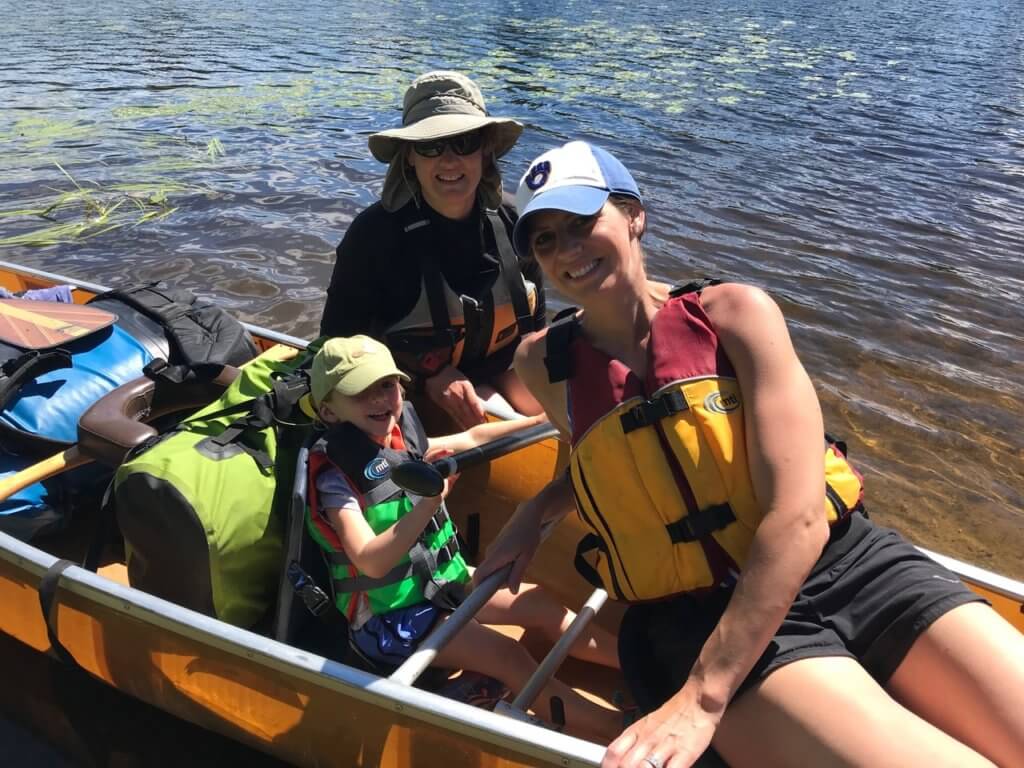Katina Daanen and the Northern Forest Canoe Trail were destined for each other long before the trail came into existence.
As a kid, Katina spent her summers swimming in Shell Lake and making camps along the shores of Ada Lake in northern Wisconsin. In her teens, she backpacked the Gallatin mountain range in Wyoming, 60-mile sections of the North Country and Ice Age trails in Wisconsin and the Pictured Rocks Trail in northern Michigan.
The adventures continued into her 20s — the Northville-Placid Trail, parts of the Appalachian Trail — and expanded to canoeing after she got married and had two kids. The paddling trips took the family to the Buffalo River in Arkansas, the Jacks Forks River in Missouri and the Namekagon and St. Croix in Wisconsin, as well as multiple excursions to the Sylvania Wilderness and the Boundary Waters Canoe Area.
It was 2010 at the annual Canoecopia event in Madison, Wisconsin, when Katina and the Northern Forest Canoe Trail first crossed paths.
“My husband Sam and I go every couple of years,” she says. “That year, we were at the show, and I wandered into the NFCT presentation, and assumed it was something in Minnesota. Since I have this background with wilderness canoe trips, I was intrigued.”
“I listened to a talk about the trail; it was the NFCT’s 10th anniversary. It had an impact on me — I was 49, turning 50 the following year, and I thought, ‘This is what I’m doing for my 50th birthday.’ I was scheming about how I was going to do this trip while they were presenting. After it was over, my husband asked how the presentation was, and I responded that I was doing the trail the next year.”
With help from the NFCT website, social media connections and blogs from other thru-paddlers, Katina followed through on her plan to paddle the 740-miles from Old Forge, NY, to Fort Kent, Maine. Along the way, friends and supporters like Team Moxie and Laurie Chandler left her messages of support in chalk along portage paths and in the entry logs at campsites — Katina remembers it as “a little bit of trail magic.”
Like many thru-paddlers, Katina doesn’t recall any monumental moments of self-realization or herculean efforts. It’s mostly the little things: portages through oppressive heat, clouds of black flies and mosquitoes, arguments with her daughter about wedding plans (something they both laugh about now) and spotting moose and owls.
“It’s the journey,” Katina says. “That’s what it’s about.”
Katina has left her mark on the NFCT — the physical trail and the organization — in many ways, but she might be best known for authoring The Northern Forest Canoe Trail Through-Paddler’s Companion. Her first trip took 53 days and involved six different paddling partners. She relied on the official NFCT guidebook, maps and website, as well as thru-paddler blogs.
“We had this logistically challenging trip,” Katina says. “I’m a big planner in general. I looked at all these sources for information. The nature of blogs is reflection, not necessarily information, so I thought, ‘OK, I’m going to do my best to document information and pay it forward.’ There weren’t plans for a guidebook initially — I just wanted to do a more comprehensive blog. After that first trip, I started thinking about framing it as a resource for thru-paddlers.”
“I decided to do the trail again, and do it by section. This time, I wanted to check that my blog was relevant and captured the right, useful information.”
Katina put her skill as a graphic artist to work, developing maps and designing the book itself. Now complete, she keeps it up-to-date, checking in with the NFCT team and fellow paddlers to make sure campsites, portages and other aspects of the trail are current.
As the NFCT celebrates its 20th anniversary in 2020, Katina plans to keep sharing information with paddlers about section paddling, side trips and more. She also wants to support the organization and its partners in leveraging the trail to support communities.
“I’m mindful of the trail communities and how they can benefit,” Katina says. “Places in New Hampshire that are still recovering from the decline of the paper industry — similar to Appalachian Trail communities, these places can cater to the recreation economy.”
Katina also hopes to see the human connections the trail creates continue to strengthen.
“There’s this whole class from my era that’s become close because of the trail, and we remain connected because of the Facebook groups, the blogs, the events — it’s impacted me in ways I never could have predicted.”
To learn more about Katina’s work, visit nfctpaddler.com. To share your stories of the Northern Forest Canoe Trail in celebration of its 20th anniversary, contact Chris Morris at chris@northernforestcanoetrail.org.
